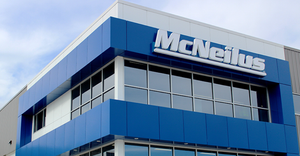Advanced Disposal Services, Casella Waste Systems Announce Q1 2018 Earnings
Both firms saw positive year-over-year growth in various areas of business.
Ponte Vedra, Fla.-based Advanced Disposal Services, Inc.’s revenues for the first quarter of 2018 were $364.7 million, up from $347.4 million in 2017. Meanwhile, Rutland, Vt.-based Casella Waste Systems Inc.’s revenues increased 10.2 percent from the same period in 2017, and its solid waste volumes increased 6.6 percent. Both firms, while posting overall positive earnings, experienced recycling headwinds.
Here’s a breakdown of the earnings reports for both firms.
Advanced Disposal Sees 5 Percent Increase in Revenue, $9.1 Million Increase in Net Income
Advanced Disposal’s revenues for the first quarter of 2018 were $364.7 million compared with $347.4 million for the same 2017 period. Net income during the first quarter was $2.1 million, or $0.02 per diluted share, and adjusted net income, which excludes certain gains and expenses, was $7.7 million, or $0.09 per diluted share, in the first quarter 2018. Net loss was $7.0 million, or $0.08 per diluted share, in the first quarter 2017, and adjusted net income was $3.7 million, or $0.04 per diluted share, in the first quarter 2017.
"Advanced Disposal continues to improve its overall profitability highlighted by a $9.1 million increase in net income and a $6.9 million increase in adjusted EBITDA year-over-year" said Richard Burke, CEO of Advanced Disposal, in a statement. "Based on our first quarter results, we remain on track to achieve our full year earnings and free cash flow guidance."
Other highlights for the first quarter:
Overall revenue increased by 5 percent over the prior year period, despite an $8.0 million decrease related to the adoption of the new revenue recognition standard.
The company’s average yield was 1.9 percent and its organic volume growth was 2.4 percent.
Year-over-year growth from acquisitions was 3.6 percent, as Advanced Disposal benefited from the rollover impact of acquisitions completed in 2017 and five tuck-in acquisitions completed in the first quarter of 2018.
Net income increased $9.1 million versus the prior year. Adjusted net income improved $4.0 million to $7.7 million and adjusted diluted earnings per share was $0.09.
Adjusted EBITDA grew 7.9 percent to $94.1 million.
Year-to-date cash provided by operating activities declined $16.3 million to $78.5 million due to the cycling of a $24 million payment received in the first quarter of 2017 in exchange for assuming certain post-closure liabilities of a closed portion of a landfill.
Solid waste collection accounted for 69.2 percent of reported revenue ($252.5 million vs. $241.2 million in 2017). Solid waste disposal and transfer accounted for 33.9 percent ($124.1 million vs. $114.8 million 2017). Sale of recyclables (1.5 percent), fuel charges and environmental charges (7.7 percent), intercompany eliminations (decrease of 19.7 percent) other (7.3 percent) accounted for the remainder.
The company’s cost of operations, excluding accretion in Greentree expenses, as a percentage of revenue was 62.7 percent, compared to 63.3 percent the year prior. The adoption of the Rev Rec standard added in an 80 basis point positive impact to the cost of operations as a percentage of revenues. The $8 million reduction in revenue and operating expenses impacted were transfer station and disposal costs by $1.2 million and franchise fees and taxes by $6.8 million. Normalizing for the Rev Rec impact, the company’s cost of operations increased 20 basis points as a percentage of revenue.
Adjusted free cash flow, which normalizes the company’s cash generation for non-recurring receipts and payments, improved $8.8 million to $49.3 million.
The sale of recyclables only makes up about 2 percent of the company’s total revenue, but, Advanced Disposal is continuing its efforts to reduce volatility for this line of business by executing on a couple of key initiatives. “First, we are customer focused and environmentally conscious and will continue to deliver services that customers and communities deem valuable,” said Burke on a call with investors. “Second, we want to cover operating contract cost through contracts that result in us getting paid for the collection and processing of recycled materials, and we're willing to share more of the change in commodity prices with our customers to achieve this outcome. And third, we want to help educate customers around the difference between diversion and recycling. … Changes in this line of business will not happen overnight, but as we continue to work on these objectives, we believe we will help create a more sustainable, recycling model for our customers and our shareholders.”
When it comes to safety, Burke said on a call with investors, “It’s safety first and safety always because it’s too important to be ranked. It's the first and foremost thing on our mind as we lead the company, and we’re looking at not just training up front, getting people through the door, getting them trained in order to drive the truck, but [looking at] what technology we can use in the cab. … We’ve been upgrading that technology over time, and we’ll continue to drive that through the organization where we can take more proactive steps.”
Casella Waste Systems Posts Strong Earnings Results, Despite Recycling Headwinds
Casella’s revenues increased 10.2 percent, or $13.7 million, from the same period in 2017, with revenues growth mainly driven by robust collection and disposal pricing, higher solid waste volumes, higher organics and customer solutions volumes and the roll-over impact from acquisitions, partially offset by lower recycling commodity prices and volumes. Adjusted EBITDA was $24.6 million, up $1.5 million, or 6.4 percent, from a year ago, with growth mainly driven by improved performance in the company's collection and disposal lines-of-business, partially offset by a decline in the recycling line-of-business.
"We had another strong operational quarter, as we continued to execute well against our key strategies," said John W. Casella, chairman and CEO of Casella Waste Systems, Inc., in a statement. "We remain focused on creating shareholder value through increasing landfill returns, improving collection profitability, creating incremental value through resource solutions, driving general and administrative efficiencies and strong capital discipline. The progress we have made on our strategies is apparent in the positive financial results in the first quarter, despite significant recycling headwinds. Our disciplined solid waste pricing programs continued to add value, with landfill pricing up 4.9 percent and collection pricing up 4.8 percent. This strong pricing was coupled with 6.6 percent solid waste volume growth, mainly driven by robust disposal volume growth. Roughly 60 percent of our disposal volume growth during the quarter was driven by a one-time $3.5 million soil remediation project for a key customer, and the remaining 40 percent was driven by higher landfill volumes across all waste types as we continued to source new landfill volumes at higher prices in the tightening northeastern disposal markets."
Here are some other highlights from the firm’s results:
Net cash provided by operating activities was $12.8 million for the quarter, up $2.1 million, or 19.8 percent, from the same period in 2017.
Normalized Free Cash Flow was $7.2 million for the quarter, up $6.1 million, or 529.5 percent, from the same period in 2017.
Overall solid waste pricing for the quarter was up 4.3 percent, driven by strong landfill pricing, up 4.9 percent, and robust collection pricing, up 4.8 percent.
Solid waste volumes were up 6.6 percent in the first quarter, mainly driven by robust disposal volume growth.
Recycling commodity prices were down 37 percent from the fourth quarter of 2017 to the first quarter of 2018, which is mainly due to lower paper and cardboard pricing. Overall mixed paper prices were down 90 percent from April 2017 to April 2018, and old corrugated cardboard prices were down more than 50 percent during the same period.
Operating income was $0.8 million for the first quarter, as compared to $6.6 million for the same period in 2017. Adjusted operating income was $4.8 million for the quarter, down $1.7 million from the same period in 2017.
Solid waste collection accounted for 45.1 percent ($66,475) of reported revenue, solid waste disposal accounted for 27.3 percent ($40, 234), power generation accounted for 1.2 percent ($1,799) and processing accounted for 1.0 percent ($1,420).
When it comes to recycling, Casella said in a statement, “Commodity pricing for recycled paper and cardboard continued to deteriorate during the first quarter due to China's ban on mixed paper and new lower contamination standards," said Casella in a statement. "Our average commodity revenue per ton was down roughly 50 percent year-over-year, with mixed paper pricing down over 90 percent during this same period. Our risk mitigation programs are working well to help offset this historic decline in commodity prices. However, several factors contributed to an under recovery during the quarter, including: the rapid sequential decline in commodity prices from December to March caused our recovery fees to get behind due to their calculation based on a one-month trailing index; we are absorbing all of the commodity pricing risk on several legacy contracts, which make up roughly 15 percent of our commodity sales; and our variable costs were up as we had to slow processing lines to improve quality while we incurred higher transportation costs to deliver commodities to new markets. Given these headwinds, recycling operating income missed budget by roughly $2.0 million during the quarter."
As far as mergers and acquisitions go, Casella said in a statement, “As we first announced in early August 2017, we have adjusted our capital strategy to balance de-levering with prudent growth through acquisition or development investments. We have set a goal to grow revenues by $20.0 million to $40.0 million per year through acquisition or development activity for the next three years as part of this new strategy. We are off to a great start with this strategy, with roughly $20.0 million of acquired revenues over the last four months. Our acquisition pipeline remains robust, and we believe that investing a portion of our excess cash flows to grow our business will create additional shareholder returns through higher cash flows driven by new revenue streams, internalization to our disposal facilities and cost synergies."
Ed Johnson, president and COO of Casella, said on a call with investors that safety is the company’s first priority, with customer service being a close second. It’s the first thing the company talks about at internal meetings or events. The company’s workers’ compensation claims were down 26 percent from the first quarter of 2017.
About the Author
You May Also Like




